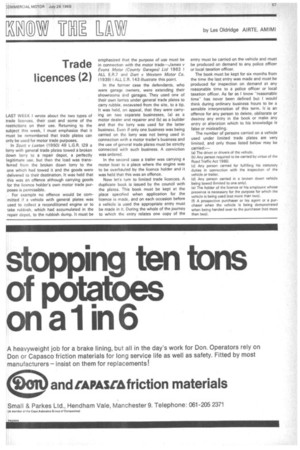Trade licences (2)
Page 69

If you've noticed an error in this article please click here to report it so we can fix it.
LAST WEEK I wrote about the two types of trade licences, their cost and some of the restrictions on their use. Returning to the subject this week, I must emphasize that it must be remembered that trade plates can only be used for motor trade purposes.
In Scutt v Luxton (19501 48 L.G.R. 129 a lorry with general trade plates towed a broken down lorry to a repair depot, a perfectly legitimate use, but then the load was transferred from the broken down lorry to the one which had towed it and the goods were delivered to their destination. It was held that this was an offence although carrying goods for the licence holder's own motor trade purposes is permissible.
For example no offence would be committed if a vehicle with general plates was used to collect a reconditioned engine or to take rubbish, which had accumulated in the repair depot, to the rubbish dump. It must be emphasized that the purpose of use must be in connection with the motor trade—James v Evuns Motor (County Garages) Ltd 1963 1 ALL E.R.7 and Dart v Western Motor Co. (1939) I ALL E.R. 143 illustrate this point.
In the former case the defendants, who were garage, owners, were extending their showrooms and garages. They used one of their own lorries under general trade plates to carry rubble, excavated from the site, to a tip. It was held, on appeal, that they were carrying on two separate businesses, la) as a motor dealer and repairer and (b) as a builder and that the lorry was used for the latter business. Even if only one business was being carried on the lorry was not being used in connection with a motor trader's business and the use of general trade plates must be strictly connected with such business. A conviction was ordered.
In the second case a trailer was carrying a motor boat to a place where the engine was to be overhauled by the licence holder and it was held that this was an offence.
Now let's turn to limited trade licences. A duplicate book is issued by the council with the plates. This book must be kept at the place specified when application for the licence is made, and on each occasion before a vehicle is used the appropriate entry must be made in it. During the whole of the journey to which the entry relates one copy of the entry must be carried on the vehicle and must be produced on demand to any police officer or local taxation officer.
The book must be kept for six months from the time the last entry was made and must be produced for inspection on demand at any reasonable time to a police officer or local taxation officer. As far as I know "reasonable time" has never been defined but I would think during ordinary business hours to be a sensible interpretation of this term. It is an offence for any person to delete, obliterate or destroy any entry in the book or make any entry or alteration which to his knowledge is false or misleading.
The number of persons carried on a vehicle used under limited trade plates are very limited, and only those listed belowmay be carried:—
(a) The driver or drivers of the vehicle.
lb) Any person required to be carried by virtue of the Road Traffic Act 1960.
lc) Any person carried for fulfilling his statutory duties in connection with the inspection of the vehicle or trailer.
(d) Any person carried in a broken down vehicle being towed (limited to one only).
le) The holder of the licence or his employee whose presence is necessary for the purpose for which the vehicle is being used (not more than two).
(f) A prospective purchaser or his agent or a purchaser when the vehicle is being demonstrated when being handed over to the purchaser (nOt more than two).












































































































